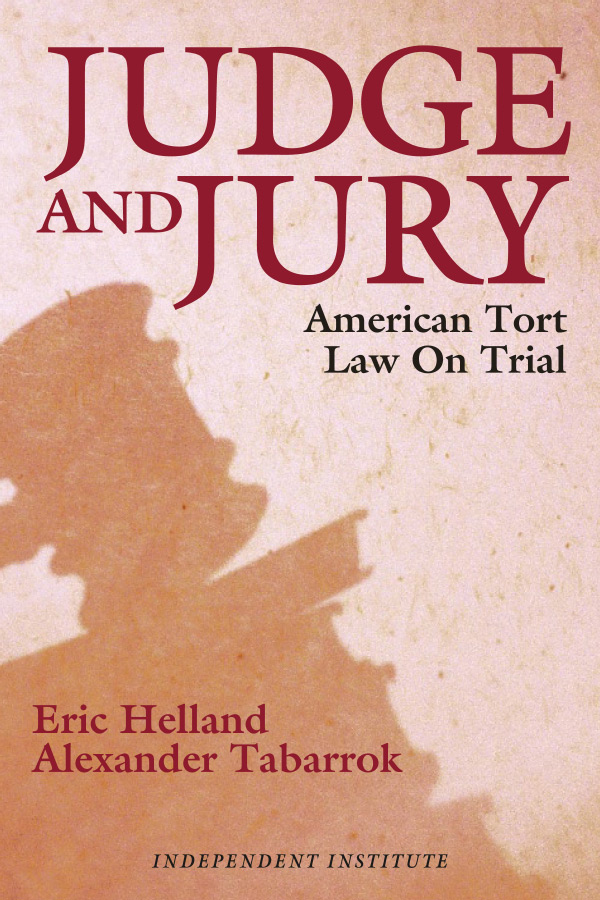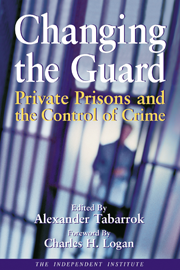It’s going to take more than a giant garage sale to balance California’s budget. In one way, however, Gov. Arnold Schwarzenegger is fortunate he inherited a system with lots of room for improvement.
On the verge of being taken over by a Federal receiver, California’s expensive and inefficient prison system is a case in point. Texas houses about the same number of prisoners as does California, but the California taxpayer pays almost twice as much per inmate: around $30,000 per year, more than the cost of a decent college education.
If California prisons were unusually effective, the high cost might be acceptable. But with 300,000 prisoners packed into a system designed for only 170,000, it’s a challenge simply to warehouse the prisoners, let alone provide effective programs for rehabilitation. Schwarzenegger has said that prison reform is a priority. If so, he ought to privatize prisons both to lower costs and to improve efforts at rehabilitation.
More than two decades of experience with private prisons in the United States, Great Britain, Australia and elsewhere attest to the fact that private prisons can be built and operated at lower cost than public prisons.
Cost savings of 15 to 25 percent on construction and 10 to 15 percent on management are common. These are modest but significant cost savings in a $5.7 billion state system that continues to grow more expensive every year.
Private prisons not only have lower costs than public prisons: by introducing competition they encourage public prisons to also innovate and lower costs.
States with a greater share of prisoners in private prisons have lower costs of housing public prisoners. Perhaps more tellingly, from 1999 through 2001, states without any private prisons saw per-prisoner costs increase by 18.9 percent, but in states where the public prisons competed with private prisons, cost increases were much lower, only 8.1 percent.
The bad rap on private prisons has always been that cost-savings would come at the expense of quality. In California today this hardly passes the laugh test as federal Judge Thelton Henderson considers placing California’s system in receivership because of numerous problems, including the protection of corrupt prison officers and the lack of proper investigation of prisoner abuse.
Careful studies by the U.S. Department of Justice’s National Institute of Justice and others indicate that if anything, private prisons are of higher quality than public prisons.
In fact, although prison privatization in the United States has been driven by cost savings, in Britain the driving motivation was higher quality, more humane prisons.
After studying the issue, the director general of Her Majesty’s Prison Services concluded that the private prisons “are the most progressive in the country at controlling bullying, health care, and suicide prevention.”
To be sure, no system can escape flaws, but contracts with private prisons can be canceled. How often are government prisons shut down for cost overruns or abuse of prisoners? Similarly, if rehabilitation can work, it is likely to work better in a system where prisons can be made accountable.
Public bureaucracies are typically less efficient than private firms, but in California the problem of poor incentives is compounded by the political power of the California Correctional Peace Officers Association. CCPOA has long been one of the most powerful unions in the state and has used its power to increase the wages of prison guards. Under form Gov. Gray Davis, forexample, wages for prison guards increased dramatically and are now among the highest in the nation.
The guards have raised wages in less obvious ways as well. A “fitness bonus” was initially restricted to guards who could pass a fitness test. Over time, however, the requirements for the bonus were weakened until today almost every guard receives a bonus, averaging $1,550, just for showing up once a year at a doctor’s office.
A grateful CCPOA recycled millions of dollars of higher wages into campaign funds for Davis and other supporters.
The guards have also exercised their power in more slick ways. By heavily supporting victims’ rights groups who campaigned for the three-strikes law, longer sentences, and fewer opportunities for rehabilitation and parole, the guard union has artfully increased the demand for its services. One wonders sometimes whether the prisons are more often built to house the prisoners or the guards.
Schwarzenegger should encourage the building of some private prisons as well as privatize some public prisons. Private prisons will reduce costs, not only at their own facilities, but at public prisons as well: Pressured by real competition, public prisons will be forced to cut the fat or risk losing state support. At the same time that costs are reduced, prison privatization will lay the foundation for a more open political system one in which a single special-interest group cannot dominate what should be matters of public policy.












